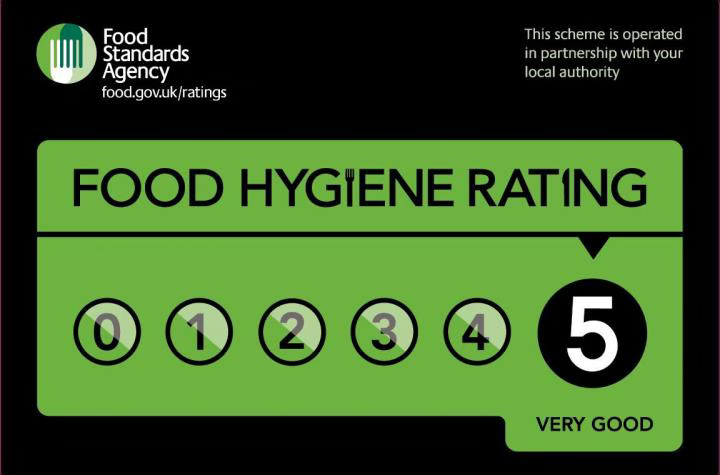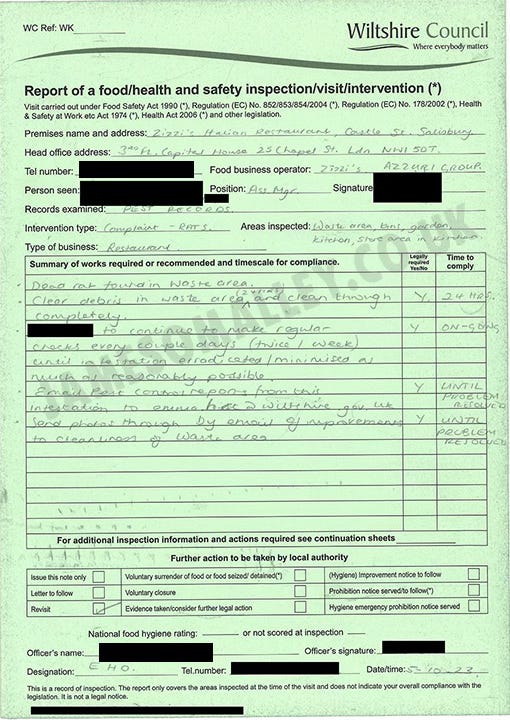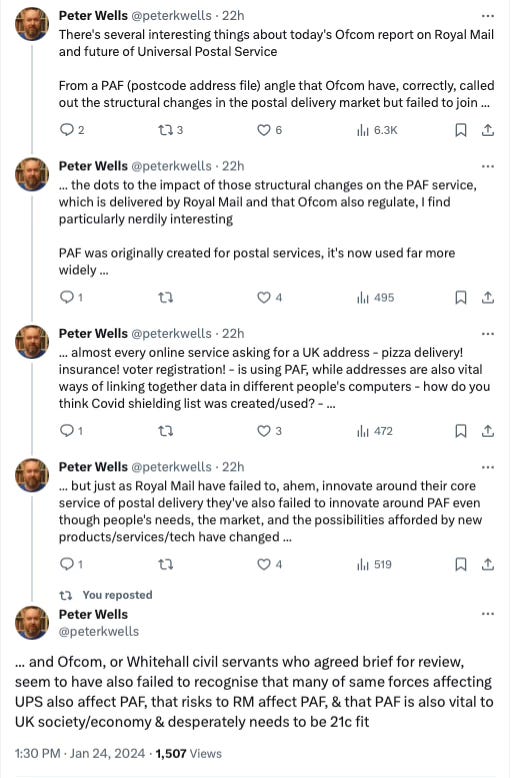Odds and Ends #25: Exclusive! Salisbury Zizzi struck by health and safety problem six years after the poisonings
In which I (sort of) do some investigative journalism. Plus more on local news, culture wars, and freestyle rap.
Hello! It’s time for Odds and Ends, your weekly mini newsletter-within-a-newsletter containing some shorter takes, interesting links, and this week, something rather silly indeed.
A Brief Programming Note: Apologies for the lack of big essay this week – I’m afraid a few other deadlines have caught up with me. Rather than rush something half-arsed out, I’m going to wait and post the next one early next week, to get back to an early-in-the-week schedule. Sorry about this everyone – I know I owe you an extra post!
Anyway, assuming you forgive me, let’s get on with this week’s bumper-sized Odds and Ends as not only do I have a scoop of, er, sorts – but I’ve also got more on the death of local news, and a cool freestyle rapper to show you. Oh, and there’s of course some postcode stuff too.
The second worst thing to happen at Salisbury Zizzi
Regular readers might remember that just before Christmas, my partner and I went on a trip to Salisbury. After seeing the spire – famously so good that you have to see it twice – we had dinner at (where else?) the local branch of Zizzi, which was the site of the notorious Novichok poisoning of Sergei and Yulia Skripal in 2018.
Unsurprisingly, following the attack, the Zizzi closed for around eight months for investigations and for a thorough clean. But as I sat there, munching on my garlic bread and considering matters of geopolitics, it made me wonder: What does a major international state-sponsored terror incident do to your restaurant’s food hygiene rating?
So I sent Wiltshire Council a Freedom of Information request to find out, and I managed to obtain the three inspectors’ reports written since the reopening in November 2018.
Let’s start with the good news. I’m pleased to report that in the first inspection, about six weeks after opening back up, Zizzi smashed it, earning a rating of 5 – though the inspector noted that a dirty mop was placed slightly too close to the freezer. Which I suppose is a better review than discovering some Novichok residue in the gents.
The next inspection, in 2022, was a similar five star affair – with only a few minor notes, like a crate of newly delivered supplies being placed close to a food preparation area, and how better separation was needed.
But then we get to 2023.
It appears that six years on, the restaurant is still a site of some health and safety concern. Reading the inspection report closely reveals that last October, just under two months before I ate there, the restaurant was slammed… for having a rat problem.
Hey, I didn’t ever say the problem was anything to do with the whole poisoning thing.
It’s not clear from the report whether the dead rat found in the waste area was some sort of radioactive mutant rat, or just the regular kind, but what was clear was that the health and safety inspector was unhappy, indicating that they planned to revisit for another inspection at a later date1.
They also declined to score the restaurant entirely – though I’m not sure if this is a big condemnation, or simply because the inspection was not routine and was instead investigating a specific complaint.
But in any case, what was clear was that this could be the second-worst thing to ever happen at Salisbury Zizzi – and it was a fun excuse for me to use the clickbait headline on top of this newsletter2.
Ofcom’s Postcode Address File Snub
Royal Mail was in the news this week following a report by postal regulator Ofcom, proposing different options for reforming the Universal Service Obligation – the legal rules that, for example, oblige the company to deliver six days a week, to everywhere in the country.
The regulator’s suggestions were definitely controversial. For example, it was suggested that Royal Mail be allowed to cut deliveries to five or even three days a week. And that first class letters could instead take up to three days to arrive.
I don’t have any particularly strong feelings about this. It strikes me as a similar issue to train ticket office closures, in that the logic is completely sound (who the hell posts letters these days?) – but a weird sense of nostalgia trumps reason. And it’s probably a similarly great issue for Labour candidates to campaign on.
Anyway, my main gripe with Ofcom’s report is the lack of ambition. By which I mean, of course it didn’t propose any reforms to the current the Postcode Address File regime3.
I think this is an enormous missed opportunity for the reasons that my PAF-campaigning colleague Peter Wells outlined in a brilliant thread on Twitter.
Simply put, we know that Royal Mail is in a precarious position, to the point where the company is briefing that it might need a bailout. So… what might actually happen if the company were to collapse?
Obviously most of the attention would be on lost jobs and missing parcels – but a similarly massive problem would be that the company tasked with maintaining a critical national dataset would no longer be maintaining it. And, as Peter points out, given that PAF data undergirds a big chunk of our modern economy – this would have some really bad knock-on effects.
So it’s another good reason why politicians should look again, and liberate the PAF – not just to spur economic growth or because open data is good. But as a defensive move to hedge against further problems with Royal Mail.
Keep reading with a 7-day free trial
Subscribe to Odds and Ends of History to keep reading this post and get 7 days of free access to the full post archives.







